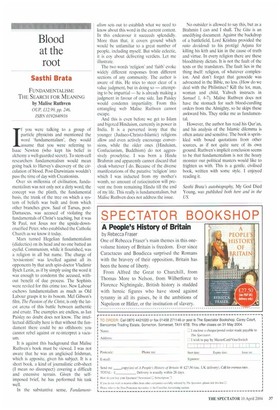Blood at the root
Sasthi Brata
FUNDAMENTALISM: THE SEARCH FOR MEANING by Malise Ruthven OUP, £12.99, pp. 246, ISBN 0192840916 If you were talking to a group of particle physicists and mentioned the word 'fundamentalism', they would assume that you were referring to Isaac Newton (who kept his belief in alchemy a well-guarded secret). To stem-cell researchers fundamentalism would mean going back to Harvey's discovery of the circulation of blood. Post-Darwinians wouldn't pass the time of day with Creationists.
Over six millennia of civilisation, fundamentalism was not only not a dirty word; the concept was the plinth, the fundamental basis, the trunk of the tree on which a system of beliefs was built and from which other branches grew. Saul of Tarsus, postDamascus, was accused of violating the fundamentals of Christ's teaching, but it was St Paul, not Jesus nor the upside-downcrucified Peter, who established the Catholic Church as we know it today.
Marx turned Hegelian fundamentalism (dialectics) on its head and no one batted an eyelid. Communism, while it flourished, was a religion in all but name. The charge of 'revisionism' was levelled against all its opponents by that arch spin-doctor Vladimir Ilyich Lenin, as if by simply using the word it was enough to condemn the accused, without benefit of due process. The Sophists were reviled for this crime too. New Labour eschews fundamentalism as much as Old Labour grasps it to its bosom. Mel Gibson's film, The Passion of the Christ, is only the latest arena of this battle between authentic and ersatz. The examples are endless, as Ian Paisley no doubt does not know, The intellectual difficulty here is that without the fundament there could be no offshoots: you cannot rebel against or re-interpret a vacuum.
It is against this background that Malise Ruthven's book must be viewed. I was not aware that he was an anglicised Irishman, which is apposite, given his subject. It is a short book, a kind of journalistic crib-sheet (I mean no disrespect) covering a difficult and extensive terrain. Given the selfimposed brief, he has performed his task well.
In the substantive sense, Fundament
alism sets out to establish what we need to know about this word in the current context. In this endeavour it succeeds splendidly. More than that, it covers ground which would be unfamiliar to a great number of people, including myself. But while eclectic, it is coy about delivering verdicts. Let me illustrate.
The two words 'religion' and 'faith' evoke widely different responses from different sections of any community. The author is aware of this. He tries to steer clear of a value judgment, but in doing so — attempting to be impartial — he is already making a judgment in favour of one side. Ian Paisley would condemn impartiality. From this entangling web Malise Ruthven cannot escape.
And this is even before we get to Islam and bigoted Hinduism, currently in power in India. It is a perverted irony that the younger (Judaeo-Christo-Islamic) religions allow and even actively encourage conversions, while the older ones (Hinduism, Confucianism, Buddhism) do not aggressively proselytise. I was born a Hindu Brahmin and apparently cannot discard that cloak whatever I do. Because of the diverse manifestations of the putative 'religion' into which I was inducted from my mother's womb, no amount of ratiocination will prevent me from remaining Hindu till the end of my life. This really is fundamentalism, but Malise Ruthven does not address the issue. No outsider is allowed to say this, but as a Brahmin I can and I shall. The Gita is an unedifying document. Against the backdrop of a battlefield, Lord Krishna provided the ratio decidendi to his protege Arjuna for killing his kith and kin in the cause of truth and virtue. In every religion there are these bloodthirsty dictats. It is not the fault of the texts or the translators. The fault lies in the thing itself: religion, of whatever complexion. And don't forget that genocide was advocated in the Bible, no less. (How do we deal with the Philistines? Kill the lot, man, woman and child, Yahveh instructs in Samuel 1, 4-7). Malise Ruthven does not have the stomach for such blood-curdling orders from the Almighty, so he skips these awkward bits. They strike roe as fundamental.
However, the author has read his Qur'an, and his analysis of the Islamic dilemma is often astute and sensitive. The book is sprinkled with boxed quotations from other sources, as if not quite sure of its own ground. Ruthven's implicit conclusion seems to be that fundamentalism is not the hoary monster our political masters would like to frighten us with. This is a gentle, civilised book, written with some style. I enjoyed reading it.
Sasthi Brata's autobiography, My God Died Young, was published both here and in the US.


































































 Previous page
Previous page